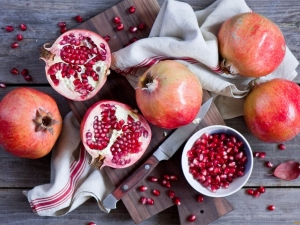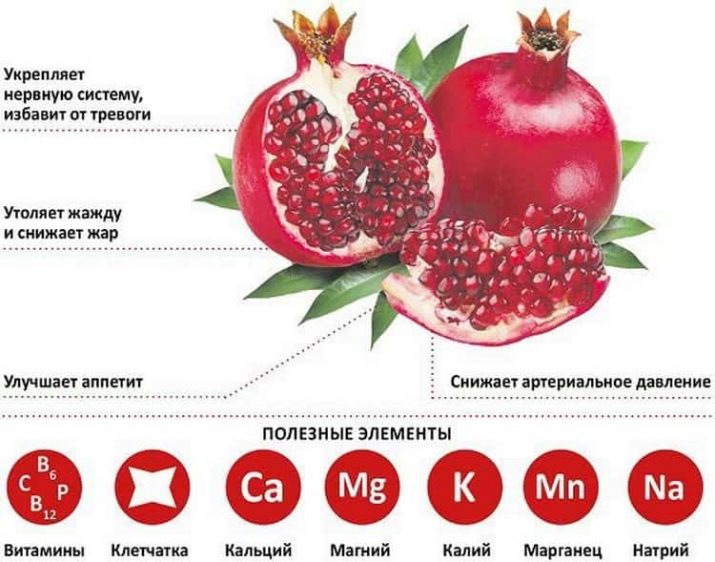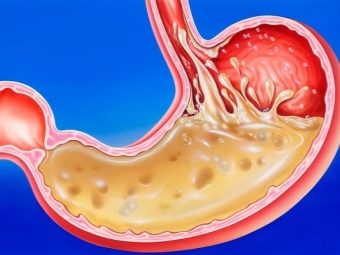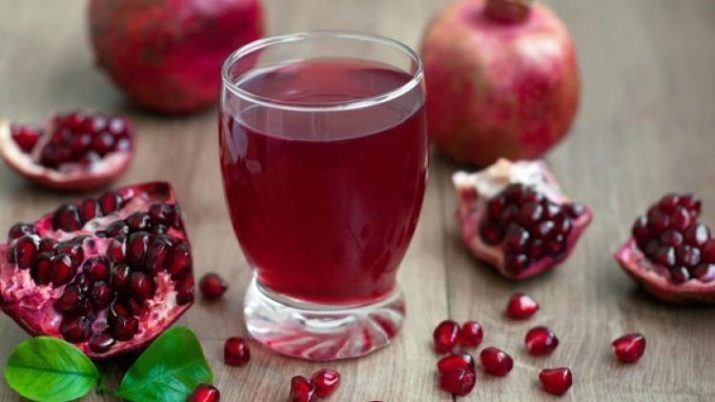Can pregnant women eat pomegranate?

Pregnancy brings visible changes to a woman's lifestyle. Her diet is no exception. In this regard, the question arises, is it possible to eat pomegranate during pregnancy, and if “yes”, then how to do it right?
Benefits during pregnancy
Pomegranate is rich in vitamins, including ascorbic acid, vitamins A, E, PP and B vitamins. Thanks to this, it is possible to talk about the immunostimulating and strengthening effect of the juicy berry (and pomegranate fruits are, from the point of view of botany, just a berry). Vitamin C helps to strengthen the immune system and demonstrates a pronounced antiviral effect. It will help to resist the mother's body to colds and infectious diseases, beriberi. This is especially important for a woman in an "interesting position" since medication, especially in the first trimester, is not recommended.

Beyond vitamins pomegranate is rich in iron, potassium, magnesium, phosphorus, calcium and some other micro and macro elements. All of the above are essential. The high content of iron in fruits helps prevent the development of iron deficiency anemia, which often develops in pregnant women. Such conditions are dangerous for the mother and fetus, as they are fraught with oxygen starvation of the child, entanglement, congenital pathologies, and even intrauterine death. Low hemoglobin can cause miscarriages and premature births, complications of labor.
In addition to iron, pomegranate contains other ingredients that improve the condition of the circulatory system. First, this antioxidants (vitamins E and C), which increase the elasticity of the vascular walls and help lower cholesterol levels. As a result, the risk of varicose veins and venous congestion is reduced. Secondly, thanks to vitamin PP improves the permeability of small vessels - capillaries. This ensures improved nutrition of tissues and organs. Finally, the fruits contain potassium and magnesium strengthening the heart, normalizing its rhythm. This is important during pregnancy, since during this period the volume of circulating blood almost doubles, naturally, the heart begins to experience increased stress.

Magnesium also helps to get rid of muscle cramps, including uterine hypertonicity. Potassium has an anti-edematous effect, removing excess fluid from the mother's body. The whole body during the period of gestation works in an intensive mode, so it is extremely important to neutralize the possible negative effects of toxins. This is helped by antioxidants, which also bind radionuclides that can provoke the development of tumors.
The combination of vitamins A and E allows the pomegranate to promote the synthesis of female sex hormones, in addition, it contains phytoestrogens, similar to those produced by the female body. They are extremely important for women's health, and especially during the period of bearing a baby. Any hormonal failure can provoke a complication during pregnancy.
During pregnancy, a woman's body is often deficient in calcium. And he, in turn, is necessary for the formation of the skeletal system of the child.With insufficient intake of calcium in the mother's body, it begins to "withdraw" from her own bones and teeth. This is why many women complain that their teeth literally “crumble”. Calcium is also necessary for hematopoiesis, the normal functioning of the nervous system.

Pomegranate is also useful due to the presence of vitamin B in it. This group of vitamins is involved in almost all vital processes. Their importance in the process of metabolism and hematopoiesis is great. Vitamin B is necessary for maintaining the nervous system, in particular, it helps to maintain calmness and improves sleep. Pregnant women are often subject to stress and unrest that are not needed during this period, and taking sedative medications is prohibited. Natural products that strengthen the nervous system come to the rescue.
In combination with phosphorus, vitamin B improves cerebral circulation. Helps a woman to maintain the desired level of concentration, allows you to get rid of the symptoms of emotional and intellectual overload. Finally, the beneficial effect of pomegranate also extends to the organs of the gastrointestinal tract of the expectant mother. The sour taste of fruits is explained by the large amount of organic acids in them. Together with tannins, they contribute to better digestion of food, and therefore, to its better assimilation.
Good digestion "starts" metabolic and lipid metabolism in the body, allowing a woman to avoid many diseases and excess weight. The fiber in the pomegranate improves intestinal motility and helps to remove toxins and toxins from the body. Pomegranate juice helps with diarrhea, and a decoction of its peels, on the contrary, produces a delicate laxative effect.The sour taste of pomegranate and juice from it also helps to cope with nausea and other unpleasant symptoms of toxicosis, improves mood, invigorates.


In the early stages of pregnancy, due to toxicosis, a woman refuses food, however, during this period it is extremely important that the food is sufficient and balanced.
Reviews allow us to conclude that pomegranate not only eliminates nausea and vomiting, but also stimulates appetite. This helps to strengthen the body, prevents the deficiency of vitamins and minerals in the body of the expectant mother.
Starting from the second trimester, the uterus begins to actively increase in size and compress the digestive organs. It is not surprising that constipation begins to torment a woman. Rich in fiber, noble burgundy fruits help to gently cleanse the intestines. In the third trimester, the diuretic effect of pomegranate comes in handy. During this period, a woman complains of swelling, which causes lethargy, high blood pressure. Pomegranate removes excess fluid from the body, which helps to get rid of puffiness.


Possible harm and contraindications
Fruits are contraindicated in case of allergies and individual intolerance to the fetus. You should not use them with increased acidity of the stomach, exacerbation of ulcers, gastritis and other inflammatory diseases of the digestive tract. Consumption of fruit saturated with organic acids during this period can aggravate the situation.
It is important to use ripe fruits for food, without signs of rot, damage to the peel.
The latter become the cause of putrefactive processes in the fruits, become the cause of the development of pathogenic microflora. All this is very dangerous for pregnant women and can cause severe poisoning.These positive properties of pomegranate juice are true for a freshly squeezed drink. Most store-bought products contain preservatives, sugars, dyes and other “chemistry” that are unnecessary for the body.


Influencing the heart and blood vessels, pomegranate is known to reduce blood pressure. This becomes the reason for the inadmissibility of its use in hypotension, that is, low blood pressure. Otherwise, weakness, dizziness, fainting cannot be avoided.
Some experts do not recommend that pregnant women eat pomegranate seeds, since it is believed that they contain special phytohormones that provoke miscarriages. You should not resort to various recipes based on pomegranate peel. It contains, albeit in small quantities, a dangerous toxin. And although a decoction based on pomegranate peels is used as a means to normalize stools, cleanse the body and fight parasites, pregnancy is still not the most suitable period for health experiments.


Features of use
Pregnant women should consume 300-400 g of pomegranate pulp 2-3 times a week. Usually it is one small fruit. You can divide the intake into 2-3 servings and eat them throughout the day. The daily dosage of pomegranate juice is no more than 150-200 ml. You do not need to drink it every day, it is enough to use it 3-4 times a week.
To combat anemia, it is more effective to take pomegranate juice. It is very concentrated, so it is diluted in half with water. Water can also be replaced with carrot juice. Raises hemoglobin drink from two parts of carrot juice, as well as pomegranate and beet juice, taken in one part. The drink should be drunk 2 times a week for 150 ml. The course of admission is 2 months.
To stimulate appetite, you can drink diluted pomegranate juice 50 ml half an hour before meals.However, before breakfast, you do not need to take such a composition, it can cause irritation of the gastric mucosa. If in the last weeks of pregnancy you feel that the pomegranate affects the intestines too much, significantly increasing its peristalsis, it is better to stop taking the fruit for a while. The fact is that, by contracting, the intestines can accidentally provoke uterine contractions and, as a result, premature birth.

With heartburn, instead of fruits, it is better to drink diluted pomegranate juice. The consumption of pulp will only contribute to an even greater release of bile and its entry into the stomach, in other words, the situation will worsen. Concentrated pomegranate acids adversely affect tooth enamel, which is especially noticeable with increased tooth sensitivity. This can be avoided by drinking pomegranate juice, which is drunk through a straw. Then you can also rinse your mouth.
For information on whether pregnant women can pomegranate, see the following video.

















